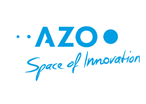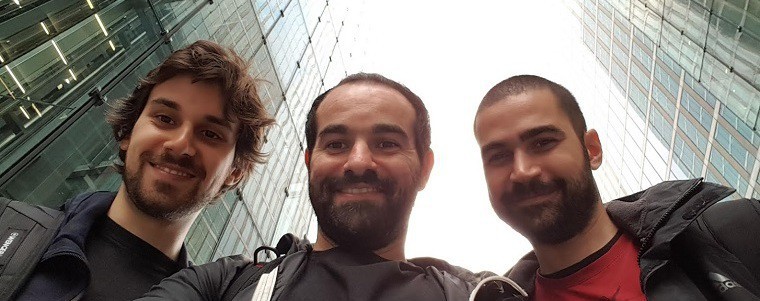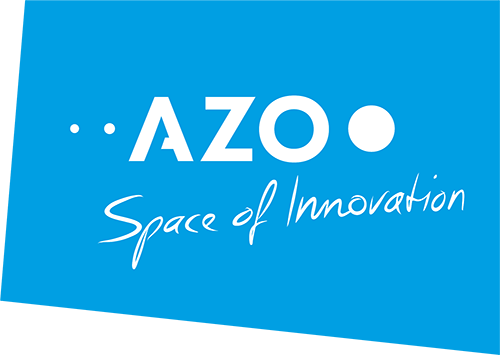NavIndo is a TUM spinoff. It has been emerged after years of research in alternative methods for localisation in GNSS-less environments. The problem that they address has been emerged from the fact that any type of signal emitted from Global Navigation Satellite System (GNSS) (e.g. Galileo, GPS, GLONASS) cannot penetrate through solid objects such as walls, which makes localisation indoors impossible. This is where NavIndo takes over with human kinetic models, state of the art machine learning and novel sensor fusion. They manage to address this problem and provide high accuracy localization to the end user.
Georgios (middle in photo) and Nikolaos (left in phoo) are Ph.D. candidates at TUM and co-founders of the company, while Efdal (right in photo) was the first member of their team. Georgios is an expert in indoor localisation with six years of experience in the field. His proposed algorithm for crowdsourced indoor mapping has been selected among the top five algorithms at the International Conference of Indoor Position Indoor Navigation in 2017. He holds a diploma degree from the Johannes Kepler University of Austria, in the field of Pervasive Computing. Nikolaos is an expert in indoor mapping, with four years of experience in related fields. Nikolaos is an expert software engineer with experience in Amazon and Siemens. He holds a diploma from the National Technical University of Athens and a Master’s degree from the Technical University of Munich in the field of software engineering. Efdal supported the venture with machine learning and iOS development.
Background of NavIndo
The idea emerged from Georgios Pipelidis who is currently researching methods and technologies that can enable the crowdsourced generation of indoor maps in his PhD thesis. As a researcher, Georgios has already published six papers on the topic. Georgios pitched the idea to Nikolaos Tsiamitros who joined the venture from the first moment and together they participated and won the second price in the connected mobility Hackathon organized by TUM, with 500 participants, and sponsored by Siemens and BMW. A few months later, they participated and won the second place in the Mobility Competition, organised by the Bavarian Center of Digitalization, winning a monetary prize of EUR 12,500. NavIndo was selected in semi-finals of Innospace Space competition organised by ESA BIC Bavaria. They were incubated at the highlight towers by IBM and UnternehmerTUM that helped them to identify business opportunities for their technology, while today they continue be supported by the chief data scientist of IBM Zurich Romeo Kinzler. NavIndo also was a finalist of the third BMVI Startup Pitch. Recently, NavIndo secured the third place among seven teams in the global competition in indoor positioning and indoor navigation. Although they do not use cameras, their algorithm performed better than Google ARCore algorithm (https://developers.google.com/ar/). They competed with global technology leaders Google, IBM, Sony and ETRI, and prestigious universities such as the Oxford University.
The present of NavIndo
Today NavIndo has attracted over EUR 550k seed funding, for EUR 5m evaluation, from private sources, such as Ferrovial the company that manages Heathrow airport, the busiest airport on earth and their first paid customer, as well as public sources such as EU funds and NGO funds such as IOTA, the most successful German cryptocurrency.
Furthermore, NavIndo has protected core components of their technology through a series of EU and US patents, while they’re working in a number of pilot projects with global leaders such as NOKIA as well as large scale Munich based companies such as MVG.
Georgios and Nikolaos have been involved in other projects of the Technical University of Munich, such as TUM-LLCM (tum-llcm.de) that has as a goal smart city research.
Where Indoor Localisation is useful
Indoor localisation is useful for a number of different scenarios beginning with maintenance, where pinpointing broken equipment is crucial for companies with vast infrastructure, such as subway station maintaining organisations. Additionally, identifying passenger bottlenecks can lead to revolutionary design of already congested airports. Dynamic environments such as exhibition centers are in a need of their robust technology for guiding their visitors through their infrastructure. Furthermore, with accessibility being listed among the human rights, navigating disabled people is a crucial need for public transportation providers. Finally, in today’s data driven world, it is essential for shop owners to collect data about moving patterns of their customers inside their shops.
Contact:
Georgios Pipelidis
NavIndo Team
contact@navindo.de
+491744079675
Boltzmannstraße 3
85748 Garching bei München
Germany




